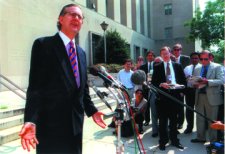In the Eye of the Storm
By LANI CARROLL HINKLE '83

Itís not the typical path of a CC grad to wind up at the center of one of the biggest government scandals in years. Charles Bakaly í77 did it, though, spending nearly a year in Washington, D.C., as the chief spokesperson for Independent Counsel Kenneth Starr.
"Government and how it works have always intrigued me," says Bakaly, who was heavily influenced in his career by Professors Tim Fuller and Bob Loevy. "I knew Iíd somehow combine law and public service. Iíve been in and out of Washington for 20 years now, and Iíve got a number of scars. But itís part of the price you pay."
A mere four years after graduating from CC (and a law degree later) Bakaly found himself in the White House as staff assistant to President Reagan and director of press advance. He served as a communications and news management advisor to Chief of Staff James A. Baker III during Reaganís first term, then joined Baker as a special assistant in the Treasury Department at the beginning of Reaganís second term. Later, he returned to his native Los Angeles as a trial lawyer, where his work included pro bono defense of indigents in federal cases and crisis management counsel to an LA judge in the aftermath of the 1992 riots. Bakaly returned to government service in 1994 as deputy independent counsel in the federal investigation of former Agriculture Secretary Mike Espy.
Appointed spokesperson for Kenneth Starr in April 1998, Bakaly joined the office several months into the investigation of President Clinton. "I was hired to develop a strategic plan that would communicate legal and public policy issues to the American people. I tried to bring focus to the law and the facts, correct misinformation, and take the personal and political out of it," says Bakaly.
As the front man for Starrís office, Bakaly answered up to 100 calls a day from the media. Federal rules about grand jury information and criminal procedure, however, limited how much he could say. "I had one -- maybe both -- arms tied behind my back. I was trying to communicate under severe restrictions. The other people commenting on the issue were not bound by the same rules."
Last spring, Bakaly was accused of leaking restricted information that lead to a Jan. 31, 1999, story in The New York Times. Maintaining his innocence, Bakaly left Starrís office on March 11.
While investigations into those allegations continue, Bakaly remains calm and confident, attributing much of his strength under pressure to his college years. "CC and its Block Plan taught me how to focus and assimilate a tremendous amount of information in a brief period of time. My experience in Starrís office was in many ways an extension of that: keeping the focus on the law and the facts and not getting distracted by polls and everything else that was going on."
When reporters thrust dozens of microphones in front of him, Bakaly kept his cool. "I learned at CC that when you have a powerful mind like Tim Fuller looking down the table and asking your opinion, youíd better have one. And youíd better be able to articulate it! I donít want to overstate it, but my training and experience at CC taught me how to think."
Eager for new challenges, Bakaly wants to remain in the problem-solving arena, possibly helping corporations develop legal and communications strategies. He's also interested in the speakers' circuit.
The D.C. drama has not dimmed Bakalyís appreciation for the simple things in life. Reminiscing about late-night forays into the culinary world of Colorado Springs as a CC student, he wonders aloud, "Is Pizza Plus (now Paninoís) still there?"
Back to Index